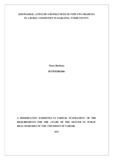| dc.description.abstract | Background: Diabetes is a chronic, debilitating disease that requires life-long treatment and greatly
increases the risk of serious long-term complications especially where poor management is
concerned. This disease requires competent self management, which can be developed from a
thorough under-standing of the disease process by an individual.
It is believed that awareness of the early symptoms of diabetes is generally low, especially in a rural
community, and this result in people with diabetes (known or unknown) to keep going to the clinics
because of a complication rather than for routine consultation or follow up. Untreated diabetes leads
to a number of serious long-term complications, including blindness, kidney disease, and neural
vascular damage leading to foot ulcers and requiring amputation, as well as predisposing to heart
attack, stroke and early death.
The impact of diabetes is further increased by its interrelationships with infectious diseases – people
with diabetes are more likely to contract TB, and the second-line antiretroviral therapy treatment of
choice for HIV in Africa has been linked with an increase in pre-diabetes, which already affects
nearly 27 million people.
The limited availability of data on knowledge, attitude and practices of diabetes management in a
rural community is one of the challenges to community responsive planning and policy making.
Objectives: This study aimed at assessing awareness levels, attitude and practices of a rural
community towards diabetes.
Methodology: This study adopted a cross- sectional design using structured questionnaires as the
main data collection tool. This questionnaire was made up of four sections ; section one, of the
questionnaire covered the respondent‘s background information, section two examined awareness of
diabetes disease, section three covered attitude and perceptions and lastly section four examined
respondents practices in preventing and controlling diabetes. The study was conducted in Jambo
Village in Karatina. | en_US |
| dc.description.department | a
Department of Psychiatry, University of Nairobi, ; bDepartment of Mental Health, School of Medicine,
Moi University, Eldoret, Kenya | |

